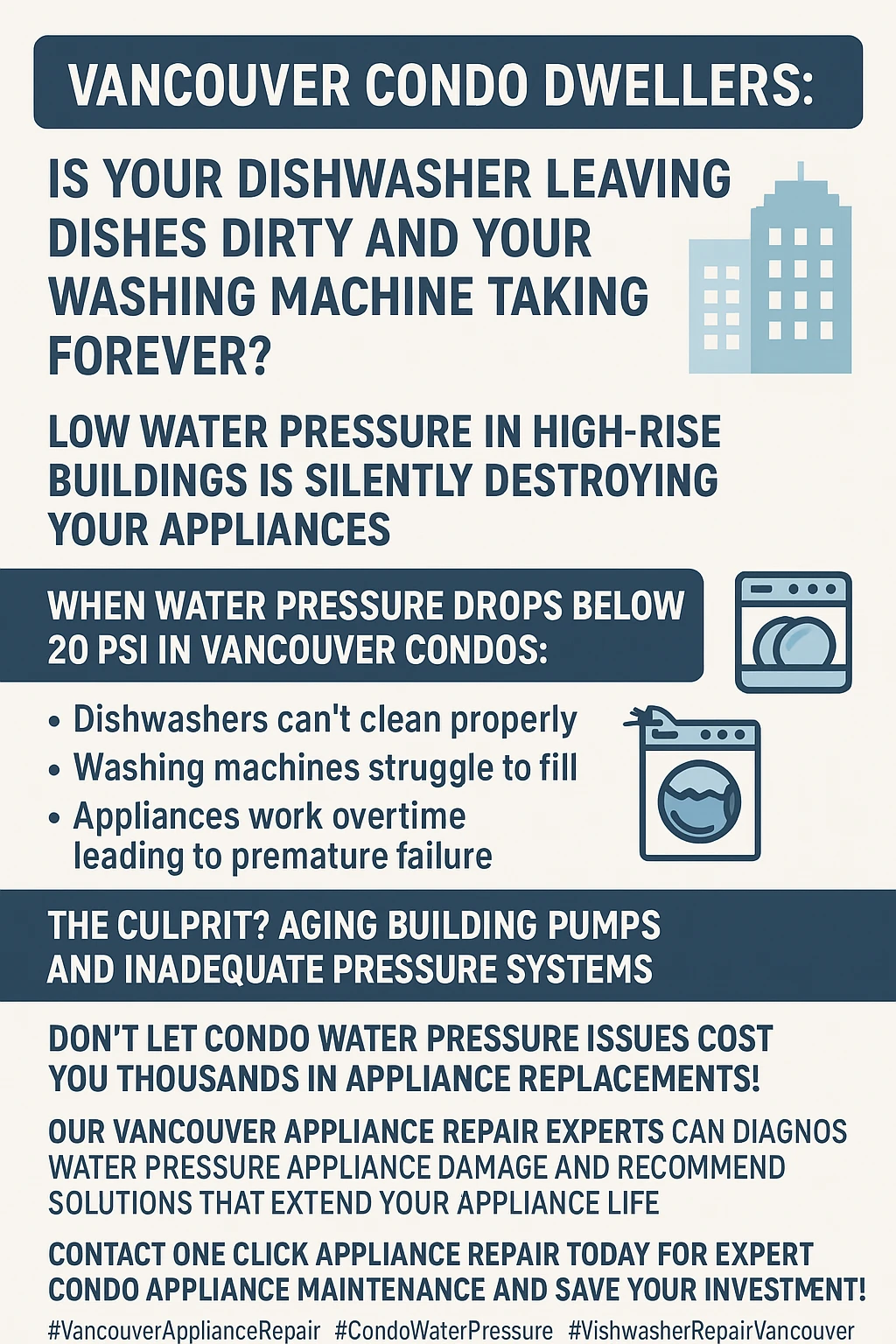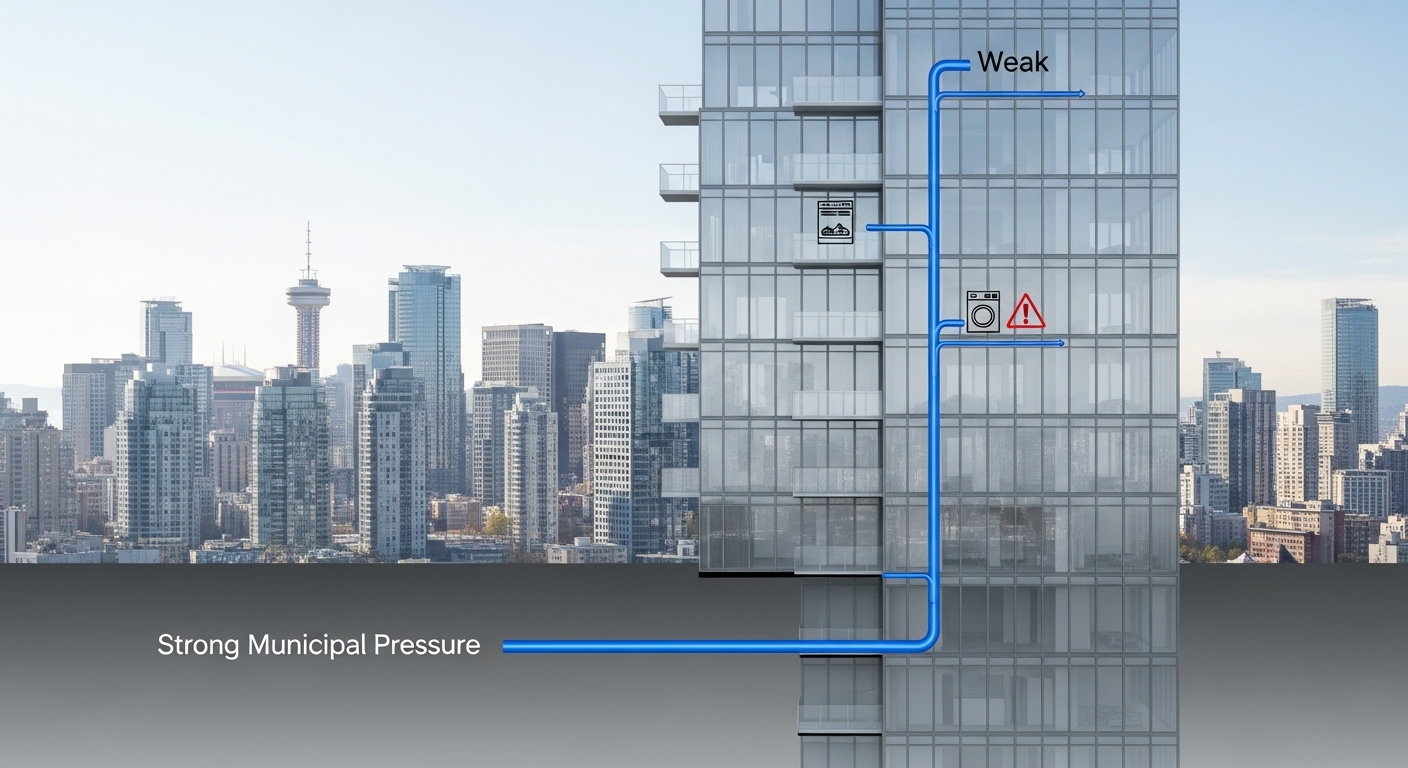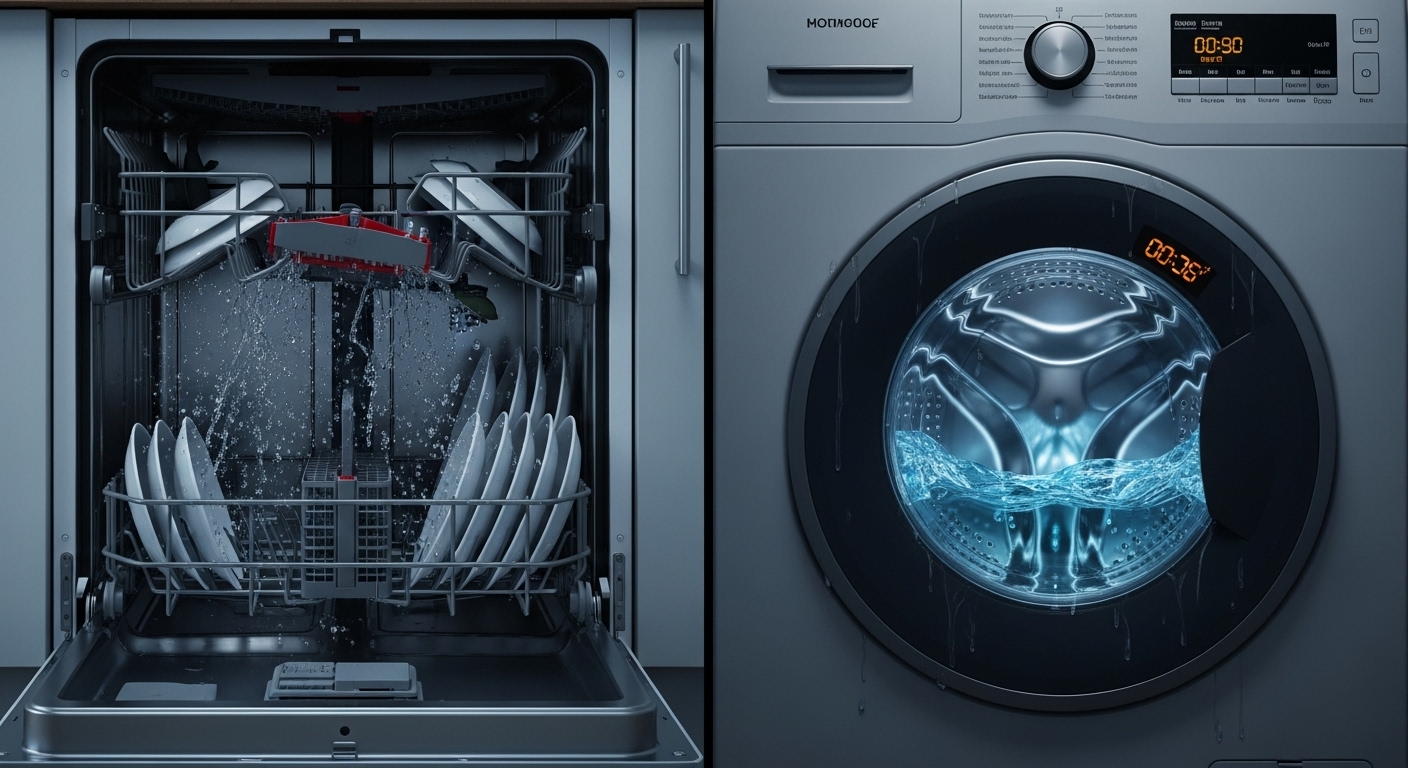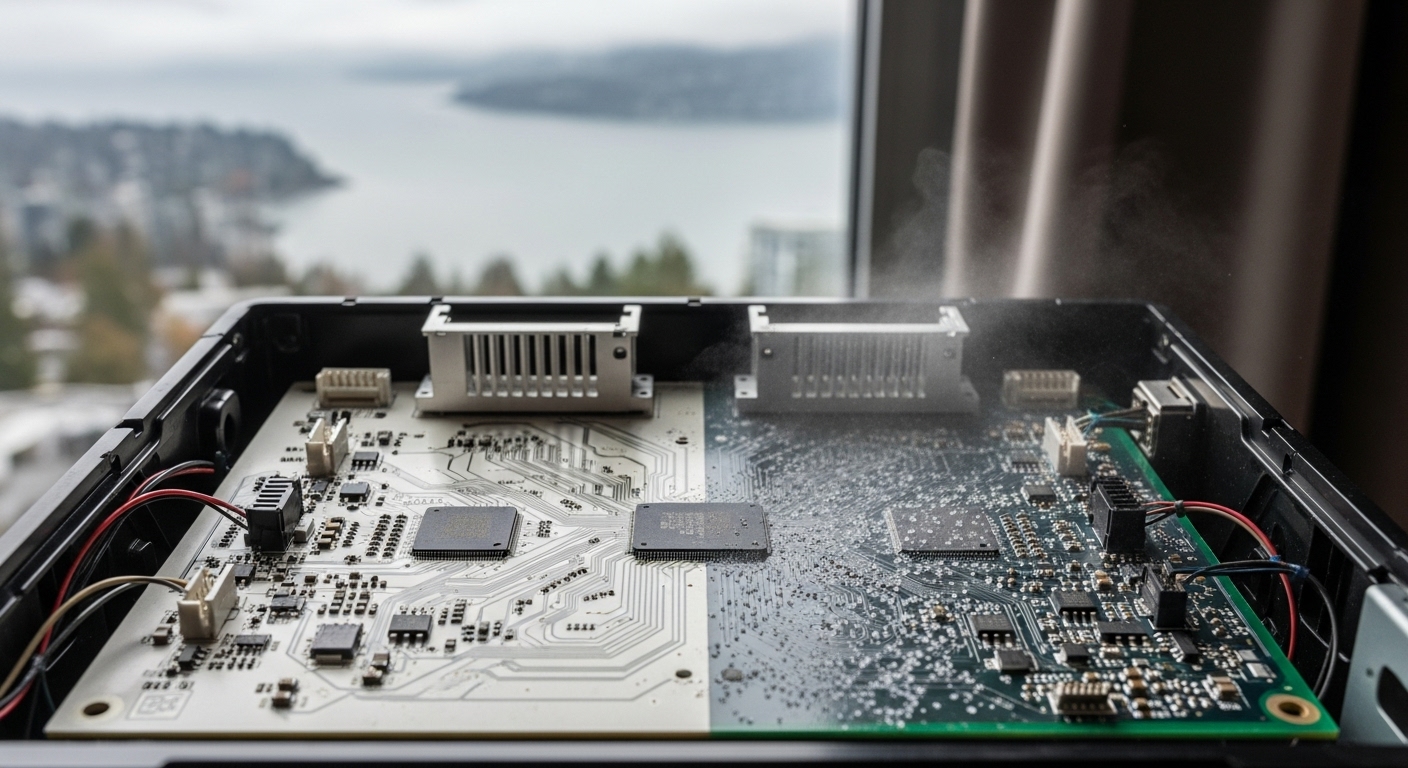Vancouver’s Condo Water Pressure Crisis: How Low Water Pressure is Slowly Destroying Your High-Rise Appliances (And the Simple Fix That Saves Thousands)
Tired of dishes coming out dirty from your dishwasher or wondering why your washing machine takes forever to fill up in your Vancouver condo? You’re not alone – and the culprit might be lurking in your building’s water pressure system, silently destroying your expensive appliances one cycle at a time.Picture this: you’ve just spent $2,000 on a shiny new dishwasher for your downtown Vancouver condo, only to watch it struggle through every wash cycle like it’s running on fumes. Your clothes come out still damp from the washing machine, and your water heater seems to be working overtime just to deliver lukewarm water. Sound familiar? Here’s the thing – it’s probably not your appliances that are the problem. It’s Vancouver’s unique combination of high-rise living challenges and water pressure issues that’s slowly but surely wreaking havoc on every water-dependent appliance in your home.Living in a Vancouver condo comes with its perks – stunning views, urban convenience, and that coveted West Coast lifestyle. But what most residents don’t realize is that their building’s water pressure system might be operating at suboptimal levels, creating a cascade of problems that can reduce appliance lifespan by up to 30% compared to single-family homes. The coastal humidity, salt air, and aging infrastructure of many Vancouver high-rises create a perfect storm that’s costing residents thousands in premature appliance replacements.But here’s the good news: most of these issues are totally fixable with some basic knowledge and a few simple adjustments. We’re talking about solutions that can extend your appliance life by 3-5 years and save you serious cash in the long run. From understanding how municipal water pressure works in buildings over five stories to making simple pressure switch adjustments yourself, there are practical steps every Vancouver condo owner can take to protect their investment.
Key Outtakes:
- Vancouver’s high-rise buildings often lack adequate municipal water pressure for floors above the 8th level, forcing appliances to work harder and fail prematurely
- Low water pressure can extend dishwasher cycles by 20-30% and reduce cleaning effectiveness, leading to both increased energy costs and mechanical wear
- Vancouver’s coastal humidity and salt air compound water pressure issues, reducing condo appliance lifespan by 20-30% compared to interior locations
- Simple DIY fixes like pressure switch adjustments and regular filter cleaning can resolve 70% of water pressure-related appliance problems
- Professional pressure system maintenance costs significantly less than premature appliance replacement, with payback periods as short as one year

The Hidden Water Pressure Crisis Plaguing Vancouver High-Rises
Walk into any Vancouver condo building constructed in the past three decades, and you’ll likely encounter a hidden infrastructure challenge that most residents never think about until their appliances start acting up. The reality is that municipal water pressure systems were originally designed for low-rise buildings, and as our city grew vertically, many buildings were constructed without adequate pressure management systems to handle the increased demand.Here’s where it gets technical but super important to understand: municipal water supply pressure is generally adequate for buildings up to five stories high, but above that point, boosting systems become essential for proper water delivery. In Vancouver’s forest of glass towers, this means that countless units on higher floors are operating with water pressure that’s barely sufficient for basic needs, let alone optimal appliance performance. The engineering reality is that without proper pressure zones and booster systems, residents on floors 8 and above often experience significantly reduced water pressure. The problem becomes even more complex when you consider that many of Vancouver’s condo buildings were constructed during the building boom of the 1980s through 2000s. These structures are now dealing with aging infrastructure where accumulation of rust and sediment over time has caused a drastic reduction in the internal diameter of piping. What started as adequate water pressure when the building was new has gradually diminished to levels that put serious strain on appliances designed to operate under ideal conditions.
The problem becomes even more complex when you consider that many of Vancouver’s condo buildings were constructed during the building boom of the 1980s through 2000s. These structures are now dealing with aging infrastructure where accumulation of rust and sediment over time has caused a drastic reduction in the internal diameter of piping. What started as adequate water pressure when the building was new has gradually diminished to levels that put serious strain on appliances designed to operate under ideal conditions.
How Low Water Pressure Systematically Destroys Your Appliances
Now that we understand why Vancouver condos often have pressure issues, let’s dive into exactly how this seemingly minor problem becomes a major appliance killer. The relationship between water pressure and appliance performance is more critical than most people realize, and the effects compound over time in ways that can turn a minor maintenance issue into a major financial headache. Your dishwasher is probably the first victim you’ll notice. When water pressure in the spray arms drops below optimal levels, the entire cleaning system breaks down. The spray arms can’t generate enough force to properly dislodge food particles, soap doesn’t circulate effectively, and the rinse cycle becomes inadequate. This forces you to run longer cycles or rewash dishes, which not only wastes energy but also puts additional mechanical stress on pumps, motors, and electronic components. Professional repair technicians report that dishwashers operating under low pressure conditions can experience pump failure up to 40% sooner than those with adequate pressure.Washing machines face similar challenges but with even more expensive consequences. When water pressure is insufficient, fill cycles extend dramatically, sometimes doubling the time needed to complete a load. This extended operation time means more wear on water inlet valves, increased strain on electronic control boards, and higher energy consumption. The agitation cycles also become less effective with lower water volumes, leading to incomplete cleaning and the need for additional rinse cycles.Water heaters take perhaps the biggest hit from pressure problems. Low pressure systems often experience irregular flow patterns that cause temperature fluctuations, forcing the heating elements or gas burners to work overtime to maintain consistent temperatures. This constant cycling dramatically reduces the lifespan of heating elements and can cause premature failure of electronic controls. Even Vancouver’s relatively soft water can’t completely prevent the mineral buildup that occurs when heating elements are overworked due to pressure issues.
Your dishwasher is probably the first victim you’ll notice. When water pressure in the spray arms drops below optimal levels, the entire cleaning system breaks down. The spray arms can’t generate enough force to properly dislodge food particles, soap doesn’t circulate effectively, and the rinse cycle becomes inadequate. This forces you to run longer cycles or rewash dishes, which not only wastes energy but also puts additional mechanical stress on pumps, motors, and electronic components. Professional repair technicians report that dishwashers operating under low pressure conditions can experience pump failure up to 40% sooner than those with adequate pressure.Washing machines face similar challenges but with even more expensive consequences. When water pressure is insufficient, fill cycles extend dramatically, sometimes doubling the time needed to complete a load. This extended operation time means more wear on water inlet valves, increased strain on electronic control boards, and higher energy consumption. The agitation cycles also become less effective with lower water volumes, leading to incomplete cleaning and the need for additional rinse cycles.Water heaters take perhaps the biggest hit from pressure problems. Low pressure systems often experience irregular flow patterns that cause temperature fluctuations, forcing the heating elements or gas burners to work overtime to maintain consistent temperatures. This constant cycling dramatically reduces the lifespan of heating elements and can cause premature failure of electronic controls. Even Vancouver’s relatively soft water can’t completely prevent the mineral buildup that occurs when heating elements are overworked due to pressure issues.
Vancouver’s Coastal Climate Makes Everything Worse
If water pressure problems weren’t challenging enough on their own, Vancouver’s unique coastal environment adds another layer of complexity that makes appliance survival even more difficult. The combination of high humidity, salt air, and seasonal weather patterns creates conditions that amplify every water pressure issue and accelerate appliance deterioration in ways that residents in drier climates never experience. Vancouver’s average 73% humidity means that appliances are constantly battling moisture in the air, even when they’re not running. When you combine this with low water pressure that forces appliances to run longer cycles, you create a perfect storm of moisture exposure and mechanical stress. Dryers have to work significantly harder to remove moisture from clothes, dishwashers struggle with proper drying cycles, and washing machines may not spin efficiently due to extended operation times.The salt air that gives Vancouver its fresh coastal atmosphere is incredibly corrosive to the electronic components that modern appliances rely on. Circuit boards, sensors, and control panels that might last 15 years in a dry inland climate can fail in 8-10 years when exposed to salt-laden air. When these electronic components are already stressed by irregular water pressure, the combination can be devastating to appliance longevity.Vancouver’s rainy season creates additional challenges that most residents don’t consider. During the October-March period, indoor drying demands skyrocket, placing additional strain on dryers and ventilation systems. High-rise buildings often provide only 8% of intended air circulation to individual units, creating moisture retention that forces appliances to work overtime. When water pressure issues prevent appliances from completing cycles efficiently, this moisture problem becomes exponentially worse.
Vancouver’s average 73% humidity means that appliances are constantly battling moisture in the air, even when they’re not running. When you combine this with low water pressure that forces appliances to run longer cycles, you create a perfect storm of moisture exposure and mechanical stress. Dryers have to work significantly harder to remove moisture from clothes, dishwashers struggle with proper drying cycles, and washing machines may not spin efficiently due to extended operation times.The salt air that gives Vancouver its fresh coastal atmosphere is incredibly corrosive to the electronic components that modern appliances rely on. Circuit boards, sensors, and control panels that might last 15 years in a dry inland climate can fail in 8-10 years when exposed to salt-laden air. When these electronic components are already stressed by irregular water pressure, the combination can be devastating to appliance longevity.Vancouver’s rainy season creates additional challenges that most residents don’t consider. During the October-March period, indoor drying demands skyrocket, placing additional strain on dryers and ventilation systems. High-rise buildings often provide only 8% of intended air circulation to individual units, creating moisture retention that forces appliances to work overtime. When water pressure issues prevent appliances from completing cycles efficiently, this moisture problem becomes exponentially worse.
The Simple Fixes Most Vancouver Condo Owners Don’t Know About
Here’s where things get exciting – most water pressure issues in Vancouver condos can be resolved with surprisingly simple solutions that don’t require major renovations or strata approval. The key is understanding which problems you can tackle yourself and which ones require professional intervention. Let’s start with the DIY solutions that can make an immediate difference in your appliance performance.The first and most effective fix is pressure switch adjustment, particularly for dishwashers. Most dishwashers have an adjustable pressure switch that controls water intake, and these often get set too conservatively during installation. Adjusting the pressure switch is surprisingly straightforward – you



